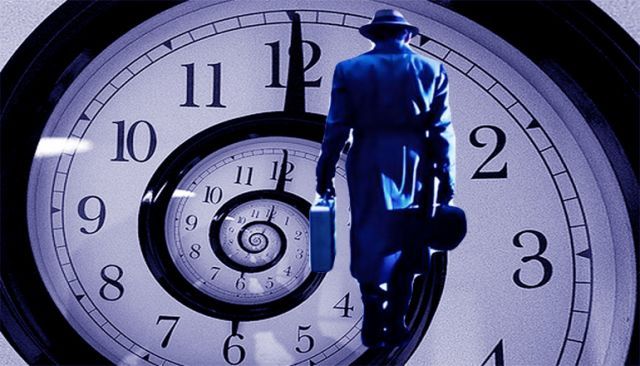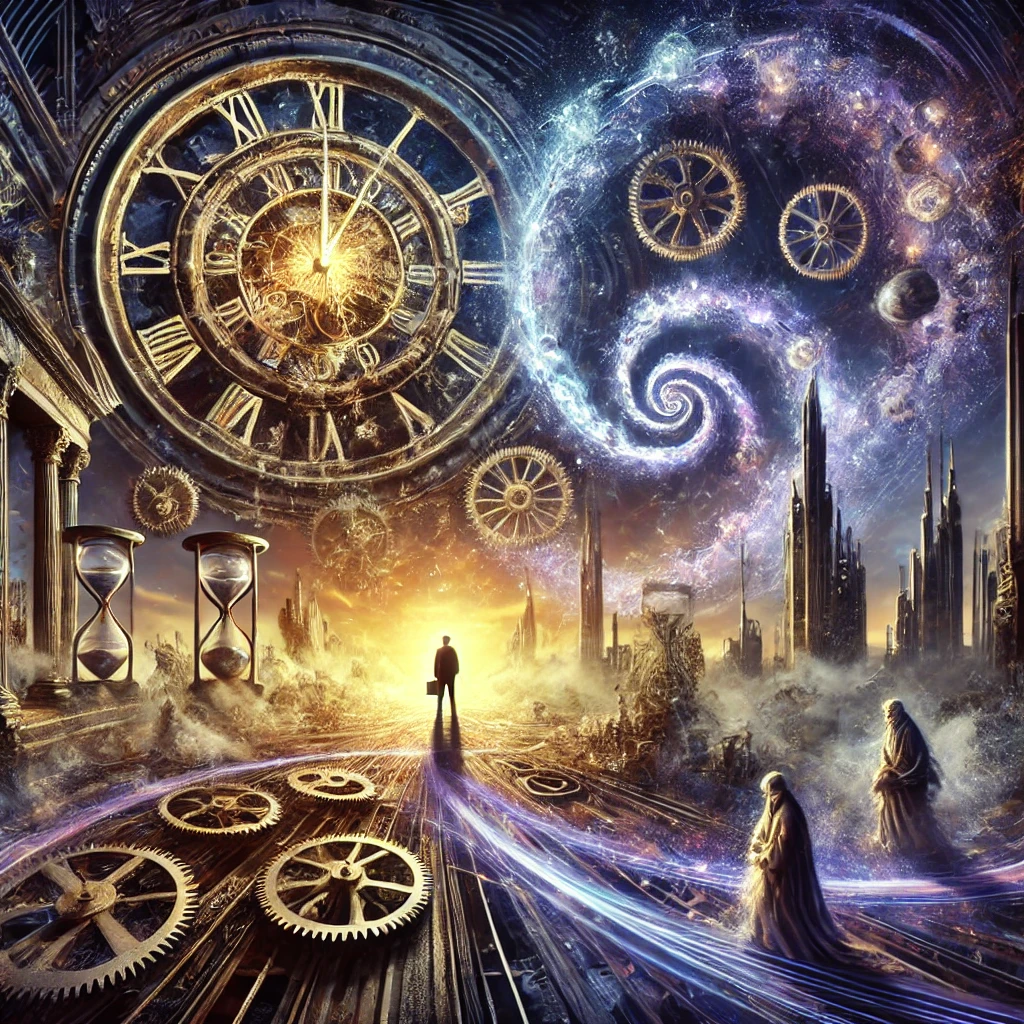Time is one of the fundamental building blocks of both our daily lives and the universe. However, this seemingly simple concept leads to profound and complex debates in science fiction and philosophical thought. Questions about whether time travel is possible, the nature of paradoxes, and the reality of time spark great curiosity from both theoretical and practical perspectives. In this article, we will explore the unknown dimensions of time, offering a broad perspective ranging from time travel to its societal and individual effects.
Time Travel and Paradoxes
Time travel is a recurring theme in science fiction, often accompanied by numerous paradoxes. One of the most well-known examples is the “grandfather paradox.” In this paradox, if a person travels back in time and kills their grandfather, their father would not be born, and therefore, they would not exist. Yet, the person has already traveled through time, creating a contradiction. Another version of this is known as the “grandchild paradox,” where a grandchild travels back to kill their grandfather, but the grandfather kills the grandchild instead. In this case, since the grandchild dies before being born, calculations about their existence become chaotic. These paradoxes raise complex questions about the nature of time: Does time only flow forward? Is it possible to reverse it? These inquiries open the door to deep discussions about the fluidity of time.
The Language and Social Dimensions of Time
Time is an ever-present concept in our lives and is embedded in our language. Verb tenses divided into past, present, and future are constantly used to express our experiences and future plans. Time also plays a significant role in social life; we must select specific time slots for meetings and appointments. This raises the question of whether time is a human invention or a universal reality.
Time: A Reality or a Human Construct?
The reality of time is a subject of philosophical debate. Some argue that time is real because we can measure it; tools like clocks, days, and weeks are human-made constructs. Units such as 60 seconds in a minute or 24 hours in a day are entirely human inventions. Do these measurements prove time’s reality? Money, for instance, is also a human invention, and it would disappear if all humans ceased to exist. Similarly, would time continue to flow in the absence of humanity?
Time and Universal Processes

Natural processes in the universe support the existence of time. Events like the movements of the sun and moon or the half-lives of isotopes indicate the passage of time. A simple example is the process of brewing tea: the water boils, the tea steeps, and it becomes ready to drink. This step-by-step process highlights the irreversibility and progression of time.
The Relationship Between Time and Change
The link between time and change is apparent to most people. Time is seen as a concept that measures change. If everything in the world were frozen and no change occurred, would time still flow? This thought experiment questions the relationship between time and change. If we argue that time can exist without change, then time is an absolute reality. If not, time is dependent on change.
Philosophical Theories of Time: The A and B Theories
To understand the nature of time, philosophers have developed two main theories: the A Theory and the B Theory. The A Theory divides time into past, present, and future. Future events occur, the present is experienced, and the past is recorded. The B Theory, on the other hand, does not divide time but instead orders events based on their sequence of occurrence. For example, a person graduating three years ago, joining the military two years ago, and getting married last year would, according to the B Theory, be events ordered chronologically.
Debates on the Reality of Time
Both theories have their shortcomings. The A Theory accepts the dynamic nature of time but finds inconsistencies in an event taking on different attributes. The B Theory is criticized for arguing that time does not involve change. These shortcomings leave the question of whether time is real as an unsolved philosophical puzzle.
The Relationship Between Time and Existence
Time is intertwined with the concept of existence. When determining whether something exists, we consider whether it is present. What should we say about something that existed in the past? For example, does Socrates exist now? Most people would say “no” but add, “he once existed.” This highlights the complex relationship between time and existence.
The Mystery of Time
Questions about what time is, whether it is real, and if it depends on change lead to philosophical debates. The A and B Theories provide significant approaches to understanding the nature of time, but their limitations preserve its mystery. Whether time is a universal reality or a human invention remains a riddle philosophers continue to solve.
Thoughts on Past, Present, and Future
Although the concepts of past, present, and future may seem fixed in our minds, they are, in fact, relative. An event that is in our past may be in someone else’s future. For example, the Euro 2008 Turkey-Czech Republic match is in our past but may exist in the future for someone who hasn’t experienced it. Our position in time determines how we experience these concepts. Instead of separating past, present, and future with sharp lines, it is better to consider them as a whole.
Eternalism: The Debate on Free Will and Fate
According to the concept of eternalism, events in the future already exist. This raises the debate on free will. If future events are already predetermined, how much control do individuals have over their destinies? This thought is similar to the relationship between God and fate. In a transcendent structure where future events already exist, both free will and destiny await us.
Fortune-Tellers and Fatalism: An Open Objection
If predictions from fortune-tellers come true, does that mean they know your fate? If some predictions about the future prove correct, does this shape our destiny? However, there is an open objection to this deterministic view: predictions about the future remain uncertain until they happen. This uncertainty exposes a flaw in fatalistic thinking, as a claim is only valid once it occurs.
The Fourth Dimension and Time
Accepting time as the fourth dimension reveals an interesting situation. Three-dimensional objects also experience the flow of time. However, in four-dimensional thought, there is no identity between “yesterday’s you” and “today’s you.” Each belongs to different slices of time. This challenges our understanding of identity in the three-dimensional framework.
Aging and the Perception of Time
When we contemplate time, we also question our lifespans. Most people find 75–80 years sufficient because aging brings physical and mental decline. However, if aging did not exist, how long would you want to live? The perception of time is individual and directly linked to our mental processes. For example, if you spent a day alone in a cave, your sense of time might distort, showing that our time perception is not as reliable as we think.
Balancing Past, Present, and Future
Living only in the present can carry certain risks. Focusing solely on “the moment” without considering the past or future may lead to hedonism, causing individuals to prioritize instant pleasures over long-term consequences. Thus, it is important to establish a balance by accounting for both the past and the future. Sacrificing today for a better tomorrow is the foundation of building a brighter future.
The Reality of Time Perception
Finally, the concept of “now” is difficult to capture. Every observation involves a delay. For example, when you look at the moon, you do not see it “as it is now” but as it was when its light traveled to reach us. This shows that all our observations are technically “delayed.” No matter how strong our sense of time is, there is always a slight delay in every experience.
The Social and Individual Dimensions of Time
Time plays a central role in both individual lives and the functioning of societal structures. Societies coordinate events and maintain social order by organizing time intervals. On an individual level, time is directly related to personal goals, aging, and mortality. The perception of time can affect one’s quality of life and personal satisfaction. For example, the aging process can significantly alter individuals’ sense of time, with differences emerging between the perception of time in youth and old age.
The Universality and Cultural Differences of Time
The perception of time can vary due to cultural differences. In Western cultures, time is often viewed as a linear process, while some Eastern cultures see it as cyclical. These cultural differences influence how time is perceived and used. Additionally, in certain communities, the concept of time is shaped by natural cycles and rituals.
The Scientific and Philosophical Aspects of Time
From a scientific perspective, time is a parameter used to measure physical events and processes in the universe. Physical time is examined in fields like theoretical physics and cosmology. Philosophically, time is associated with profound topics like existence, consciousness, and reality. Questions about what time is, how it is perceived, and how this perception impacts individuals’ lives fuel ongoing philosophical discussions.
The Future of Time and Technological Developments
Technology has significantly altered our perception and management of time. Smartphones, computers, and other digital tools help us plan time more efficiently while also influencing its perceived speed and passage. In the future, how these effects will evolve depends on technological advancements. Artificial intelligence and other cutting-edge technologies may lead to new paradigms regarding time.
Conclusion
Time is a complex and multifaceted concept from both scientific and philosophical perspectives. Discussions about the nature, reality, measurement, and perception of time have significant implications on both personal and societal levels. The questions of what time truly is, how it operates, and how we perceive it are mysteries humanity has long pondered. Understanding time requires a deep exploration of physical, philosophical, and social dimensions.

This post is pure wanderlust! The photos, stories, and tips are all so engaging. Thank you for making travel planning exciting and approachable!